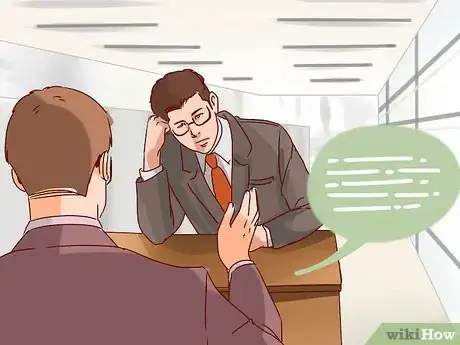This article was co-authored by Catherine Boswell, PhD. Dr. Catherine Boswell is a Licensed Psychologist and a Co-Founder of Psynergy Psychological Associates, a private therapy practice based in Houston, Texas. With over 15 years of experience, Dr. Boswell specializes in treating individuals, groups, couples, and families struggling with trauma, relationships, grief, and chronic pain. She holds a Ph.D. in Counseling Psychology from the University of Houston. Dr. Bowell has taught courses to Master’s level students at the University of Houston. She is also an author, speaker, and coach.
This article has been viewed 58,317 times.
When someone directs a passive-aggressive comment your way, you may find yourself upset or angrily ignoring them. Instead, focus on keeping your cool and not taking the bait. Stay focused in the present and avoid acting defensively. Be assertive and express your thoughts in a direct and thoughtful way. Accept that you may not change their passive-aggressive ways, but you don't have to simply put up with their behavior.
Steps
Keeping Your Cool
-
1Avoid reacting defensively. When someone makes a passive aggressive comment, you may feel the need to defend yourself, or make accusations about them. Try to avoid taking the bait—getting upset will likely do little good to change their habits.[1]
- Don’t fall into their trap of getting annoyed. Passive aggressive people act in under-handed ways to get your attention, because they lack maturity in communication.
- Act like what they said didn’t bother you instead. Relaxation techniques can help you control your impulses in these situations. Take a couple deep breaths, count to 5, or even smile to keep yourself from responding with anger. Then, respond with something like, "How about we work together on this or figure what we can both do to make this better?"
-
2Stay focused on the present. After someone makes a snide or passive-aggressive comment, you may feel like bringing up the past. You may want to compare the current situation to past transgressions that they made. This will likely just lead to more arguments and little change.[2]
- Keep the issues in the present. For example, if the current passive-aggressive comment is about the way you clean the dishes, don't start talking about their recurring lack of cleanliness around the house.
- Staying focused in the here-and-now will also help to avoid festering problems. Try finding peace with the situation in the present to prevent grudges later on.
Advertisement -
3Consider using humor to defuse the situation. This may not work in all situations, so be careful with how you use humor. You might more appropriately use it with a friend or colleague rather than a boss or authority figure.[3]
- For example, let’s say that you pass by a co-worker at work and say, “Hi, how’s it going?” Maybe they’ve ignored you in the past or seem to be avoidant. You could respond back to their lack of acknowledgment by saying, “That good, huh?” with a smile.
- Use humor as an ice-breaker to help make others feel more comfortable and less aggressive.
Being Assertive
-
1Address the comments directly. While you may want to ignore what they said and move on, if it bothers you, then it’s important to acknowledge this. Avoid letting the comment go by and then possibly letting it bother you over time. Speak up for yourself, but do so in a calm and non-confrontational way.[4]
- You might also try sleeping on it before you address the comment. If it's still bothering you the next day, then it may be worth addressing. Minor, irrelevant issues will likely no longer be of concern to you the following day.
- Use tact and respect when addressing their comments. Even if they were disrespectful to you, don’t reduce yourself to their level. Consider saying, "I sense that you're annoyed with something. Can we talk about this?"
- Be clear and concise about how their comment affected you, and why it may be an issue for you. Sometime others don’t realize how their comments are negatively affecting others. Stick with what you know—that what they said has hurt you.[5]
- Consider saying something like, "I'm not sure of your intentions with that comment, but I felt hurt when you said that."
-
2Use 'I' statements. Avoid responding to how they are acting with "you" statements, which makes them seem like they are problem. You don’t want to come off as accusing them, as they will likely to see this as more reason that they’re the victim. Instead, focus on how their comments impact you with “I” statements.[6]
- For example, let’s say a concerned family member make a passive-aggressive comment about your poor diet or health. Consider saying, “I feel sad about what was said about my health. I am trying to stay healthy, and continue to make efforts to change.”
- Consider instead using statements that use the words "we” and “our” to show inclusiveness rather than focusing on blame. However, keep in mind that this can sound condescending when talking one-on-one with someone. This could be helpful when addressing a team at work after someone makes a passive aggressive comment. For example, say, "I understand your comments and concerns. When we make statements like this, we face greater challenges in our team work. Let's come together and identify solutions in this situation."
-
3Maintain your composure. Demonstrate through your body language that their comments are not impacting you. Display a calm, cool, and powerful presence that is not threatening but also not passive.[7]
- Sit quietly, nod, and maintain eye contact. Show that you understand what’s going on, and that their comments aren’t affecting you.
- Sit high in your chair or keep a firm but not tense stance if you're standing.
Maintaining Your Distance
-
1Separate yourself from passive-aggressive people when possible. Sometimes the best way to deal with passive-aggressive comments is to avoid the people who make those comments whenever possible. While it may be impossible to avoid some people like close family members or co-workers who have little to offer except negativity, consider limiting your interactions with those individuals.[8] You may need to discuss this with your therapist to determine what is best for you.
- Reconsider interactions with friends or friends of friends who undermine you. Some passive-aggressive people may not be worth your time.
- Decline outings or events over time, and consider looking for other friends or people who make you feel more welcome.
-
2Set consequences for passive aggressive behavior. Particularly in a workplace setting or when dealing with frustrating relatives, you may need to set consequences that guide them toward collaboration rather than resistance. When well-articulated, consequences can help passive-aggressive people to rethink about their behavior.[9]
- For example, if you’re dealing with a co-worker who is disinterested in working on a team project that needs to be completed, address the possible consequences of inaction and the importance of teamwork.
- Consider offering consequences that are less threatening and more collaborative. Consider saying, “I see that this is a frustrating situation. But each member of the team relies on each other to do our work. You and I, we’re all part of team. If we can’t meet our deadline, there are consequences for this. Let’s help each other so that none of us faces those repercussions.”
-
3Accept that passive-aggressive people may not change their actions. While confronting someone about their comments in the most direct and assertive approach, avoid assuming that they will change because of this. Some people may continue to disregard your statements or consequences.[10]
- Focus on what you can control rather than what you can’t. Don’t get bogged down by other people’s misery or unhappiness with life or work.
- Be realistic that some interactions with negative or passive-aggressive people are unavoidable. Be strong and confident that you can get through this.
- Remember, even though you can't change other people, you can change your own responses and behaviors.[11]
References
- ↑ Catherine Boswell, PhD. Licensed Psychologist. Expert Interview. 18 December 2020.
- ↑ https://greatergood.berkeley.edu/article/item/how_to_stop_passive_aggression_from_ruining_your_relationship
- ↑ https://www.psychologytoday.com/blog/communication-success/201501/6-tips-dealing-passive-aggressive-people
- ↑ Catherine Boswell, PhD. Licensed Psychologist. Expert Interview. 18 December 2020.
- ↑ Catherine Boswell, PhD. Licensed Psychologist. Expert Interview. 18 December 2020.
- ↑ https://www.bumc.bu.edu/facdev-medicine/files/2011/08/I-messages-handout.pdf
- ↑ https://www.psychologytoday.com/us/blog/how-do-life/201807/composure
- ↑ https://greatergood.berkeley.edu/article/item/how_to_stop_passive_aggression_from_ruining_your_relationship
- ↑ https://www.psychologytoday.com/blog/communication-success/201501/6-tips-dealing-passive-aggressive-people
- ↑ https://www.psychologytoday.com/us/blog/how-be-yourself/202010/5-ways-deal-passive-aggressive-people
- ↑ Catherine Boswell, PhD. Licensed Psychologist. Expert Interview. 18 December 2020.
Expert Q&A
Did you know you can get expert answers for this article?
Unlock expert answers by supporting wikiHow
-
QuestionHow do you answer a passive aggressive question?
 Catherine Boswell, PhDDr. Catherine Boswell is a Licensed Psychologist and a Co-Founder of Psynergy Psychological Associates, a private therapy practice based in Houston, Texas. With over 15 years of experience, Dr. Boswell specializes in treating individuals, groups, couples, and families struggling with trauma, relationships, grief, and chronic pain. She holds a Ph.D. in Counseling Psychology from the University of Houston. Dr. Bowell has taught courses to Master’s level students at the University of Houston. She is also an author, speaker, and coach.
Catherine Boswell, PhDDr. Catherine Boswell is a Licensed Psychologist and a Co-Founder of Psynergy Psychological Associates, a private therapy practice based in Houston, Texas. With over 15 years of experience, Dr. Boswell specializes in treating individuals, groups, couples, and families struggling with trauma, relationships, grief, and chronic pain. She holds a Ph.D. in Counseling Psychology from the University of Houston. Dr. Bowell has taught courses to Master’s level students at the University of Houston. She is also an author, speaker, and coach.
Licensed Psychologist
-
QuestionWhat is the cause of passive aggressive behavior?
 Catherine Boswell, PhDDr. Catherine Boswell is a Licensed Psychologist and a Co-Founder of Psynergy Psychological Associates, a private therapy practice based in Houston, Texas. With over 15 years of experience, Dr. Boswell specializes in treating individuals, groups, couples, and families struggling with trauma, relationships, grief, and chronic pain. She holds a Ph.D. in Counseling Psychology from the University of Houston. Dr. Bowell has taught courses to Master’s level students at the University of Houston. She is also an author, speaker, and coach.
Catherine Boswell, PhDDr. Catherine Boswell is a Licensed Psychologist and a Co-Founder of Psynergy Psychological Associates, a private therapy practice based in Houston, Texas. With over 15 years of experience, Dr. Boswell specializes in treating individuals, groups, couples, and families struggling with trauma, relationships, grief, and chronic pain. She holds a Ph.D. in Counseling Psychology from the University of Houston. Dr. Bowell has taught courses to Master’s level students at the University of Houston. She is also an author, speaker, and coach.
Licensed Psychologist
-
QuestionHow do you deal with a passive aggressive person?
 Catherine Boswell, PhDDr. Catherine Boswell is a Licensed Psychologist and a Co-Founder of Psynergy Psychological Associates, a private therapy practice based in Houston, Texas. With over 15 years of experience, Dr. Boswell specializes in treating individuals, groups, couples, and families struggling with trauma, relationships, grief, and chronic pain. She holds a Ph.D. in Counseling Psychology from the University of Houston. Dr. Bowell has taught courses to Master’s level students at the University of Houston. She is also an author, speaker, and coach.
Catherine Boswell, PhDDr. Catherine Boswell is a Licensed Psychologist and a Co-Founder of Psynergy Psychological Associates, a private therapy practice based in Houston, Texas. With over 15 years of experience, Dr. Boswell specializes in treating individuals, groups, couples, and families struggling with trauma, relationships, grief, and chronic pain. She holds a Ph.D. in Counseling Psychology from the University of Houston. Dr. Bowell has taught courses to Master’s level students at the University of Houston. She is also an author, speaker, and coach.
Licensed Psychologist




































































